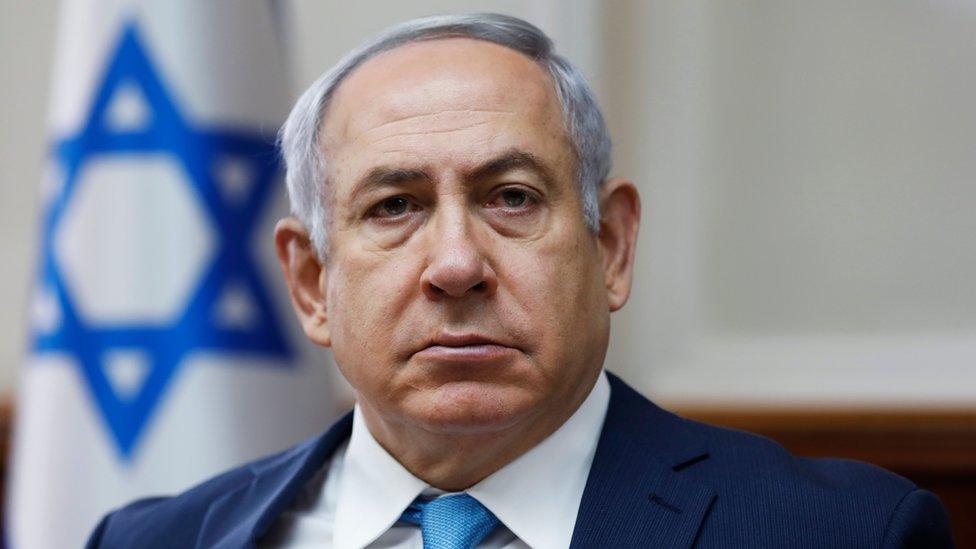Israeli press sees Netanyahu's political future in peril
- Published

Mr Netanyahu has called the bribery allegations 'baseless'
With banner headlines splashing the word "bribery" across their front pages, Israeli newspapers were filled with commentaries on 14 February, predicting the eventual political demise of Prime Minister Benjamin Netanyahu, after police recommended his indictment on corruption charges.
Mr Netanyahu has repeatedly denied any wrongdoing and denounced the case against him as biased and full of holes.
"Last night Benjamin Netanyahu began the countdown to the end of his political life," wrote Aluf Benn, editor of the left-leaning Haaretz newspaper, in a front-page column.
"He made clear that he will not leave the stage without a fight, that nothing will come of it, and that he will be re-elected. But what was important was what he did not say: he did not deny the facts published by the police.
"In the end his fate will be decided by his political coalition partners… In the coming days they will have to explain to the public why they are propping up… a leader who preaches corruption on prime time, and not dispatching him to fight for his innocence without the heavy load of leading the country… Even if he buys more time in his post, the weight of suspicion will defeat him."
Writing in the centrist Maariv daily, Udi Segal predicted that "a cloud will hover over Netanyahu every step of the way. Everywhere, in every diplomatic move or military campaign, there will be doubts whether he is doing it for legitimate reasons, or because of police suspicions".
In another column in Maariv, Ben Caspit said that Netanyahu's ultimate fate, in the hands of political allies who could bolt his governing coalition, "will only become clear in the street, in the polls, in the critical mass in the hearts and minds of Israeli citizens who still believe that Israel deserves an honest prime minister."
'On his way down'
Writing in the mass-circulation centrist Yediot Ahronot daily, columnist Sima Kadmon described Netanyahu as "on his way down".
"Even the sceptics, those who believe that there is no pit Netanyahu cannot extricate himself from, understand that this is the beginning of the end," Ms Kadmon said.
"Despite Netanyahu's promises that he will contest the next elections that will take place as scheduled, it is doubtful that deep inside he believes this. He understands that even among his avowed supporters there will be few who buy the version he tried to peddle last night, according to which the police, headed by chief Roni Alsheikh, are conspiring to unseat him."
Nahum Barnea, a leading columnist in Yediot Ahronot, said that Netanyahu should "suspend himself until the attorney general makes his decisions regarding the indictments".
"The state is more important than the prime minister," he added.
Echoing that sentiment, Yoaz Hendel, a former communications director for Mr Netanyahu, wrote in Yediot Ahronot: "Israel is more important than any person, including a prime minister. That is why the responsibility rests with Attorney General Mandelblit … that is why he has has to end it quickly, whatever the outcome."
Pro-Netanyahu paper defends PM
Alone in their defence of the prime minister were columnists for Yisrael Hayom, a free pro-Netanyahu tabloid funded by the prime minister's backer, American casino magnate Sheldon Adelson. One writer labelled the police probe "political investigations".
"Now that the police have completed their work, they should keep their distance, stop the leaks, and enable the process to continue to its resolution," said columnist Chaim Schein.
"Now the responsibility rests with the attorney general. It can only be hoped that he has the emotional strength and courage to face a hostile media and desperate politicians, who will make every effort to topple the right-wing government without elections."
The Israeli Arab media withheld independent comment, instead quoting reactions in the Hebrew press.
BBC Monitoring, external reports and analyses news from TV, radio, web and print media around the world. You can follow BBC Monitoring on Twitter, external and Facebook, external.
- Published14 February 2018

- Published21 November 2024

- Published2 January 2017
